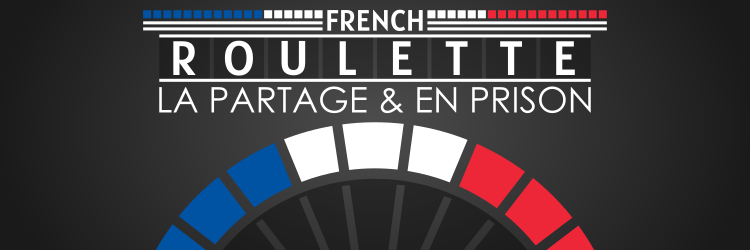
If we were to ask a regular Roulette player what variants of the game exist, the chances are that he would say two. There is European Roulette and American Roulette, and we all know what’s the main difference between the two.
But did you know that there is another, third variation of the game?
French Roulette, which many players consider a synonym for European Roulette, does bear significant similarities with its European counterpart. However, this version has something other variants do not – additional rules that make the game even more favorable.
En Prison and La Partage are two of those rules that you can find only in French Roulette. If you want to learn more about them, keep reading.
La Partage
In this version of Roulette, players have significantly better chances of winning. And La Partage is one of the main reasons for that.
La Partage is a rule that applies primarily to even money bets. Even money bets, as you know, are called that because they pay even money for wins. For instance, if you wager $1 and win $1, that’s an even money bet.
In any version of Roulette, there are only two such wagers: Odd/Even and Red/Black bets.
So, if you place any of these outside bets, La Partage will come into play.
According to the rule, players will receive half of their bet amount back should the ball land on zero. Remember, this is French Roulette, which means there is only one zero. Although it’s not unheard of to find American Roulette tables with these rules – they are scarce.
So, when the ball lands on zero, the punter will recover half of his invested sum, but that is not counted as a win. Instead, that is only the return of his investment, one that lowers the house edge to 1.35%.
Fun fact: the name for this rule comes from the word partage, which translates into English as “sharing”.
En Prison
En Prison, the second rule that we want to cover in this article, is closely related to La Partage. In essence, the situation in which these rules apply is the same. Players that place outside, even money bet get extra options if the ball lands on the zero.
But here is the catch: some casinos offer you a chance to pick between La Partage and En Prison. If you opt for La Partage, you will receive half of your invested sum back. But if you choose En Prison, you will get a second chance to place your bet.
How it works:
A zero comes up on your even money bet. The dealer signals you to choose, and you pick En Prison.
The croupier will then place a marker next to your bet, which copies your wager onto the next roll. If you win in the next round, you will win the whole sum. If you lose, you forfeit the sum.
A Real Example
If this still sounds confusing – it might be overwhelming for novices – we will give you an example.
For instance, you wagered $50 on Red. The wheel spins, and the ball lands on a zero. You now have two options: try again and accept the En Prison bet to receive $50 or nothing, or take half with La Partage, i.e. $25.
If you choose La Partage, you will receive back $25, and that’s the end of the round for you.
With En Prison, you get another shot at winning $50. If it comes up in the second spin, you win the money. If not, you lose those $50.
These rules might seem like a trivial thing to you now, but trust us – they can make a big difference. French Roulette has the lowest house edge of the three, precisely because it features these rules. The only downside to this variant is that it is not exactly prominent in US casinos.
